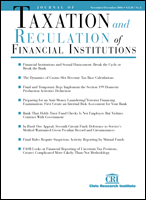Complete Issue
Author: Houman Shadab.
Source: Volume 30, Number 03, Spring 2017 , pp.1-52(52)

< previous article |return to table of contents
Abstract:
This issue opens with an article on the delicate balance financial institution must preserve to protection customer and client confidential information while at the same time fulfilling duties to disclose and cooperate with regulators. Authors Stavroula E. Lambrakopoulos, Nicole A. Baker, and Meghan E. Flinn discuss that balance in the context of investigations, examinations, and litigation. James M. Cain, Meltem F. Kodaman, and Raymond A. Ramirez, in our second article, cover financial regulators’ much anticipated variation margin rules for uncleared derivatives--an important component of post-financial crisis financial reform—which are now in effect. Secondary liability for financial institutions arising out of Ponzi schemes is the subject of our third article, by Alex C. Lakatos and E. Brantley Webb. As the authors detail with a review of the various conflicts and applicable legal doctrines, the receivers that bring such actions often have interests that are adverse to investors’ interests and particularly onerous to financial institutions. Our fourth article, by Richard S. Alembik, discusses what lenders and borrowers should know about debt cancellation in the wake of the Bobo decision, which deals with the situation where a borrower receives ordinary income while sustaining a capital loss. Mr. Alembik uses hypotheticals that contrast with the situation of the borrowers to illustrate the issues at play in delinquent loan workouts. Next, Michael A. Krajcer revisits and analyzes IRS regulations expanding the R&D tax credit for software development by financial institutions. The largely taxpayer-friendly regulations, first proposed in early 2015, contained several ambiguities that were clarified in the final October 2016 rules, as Mr. Krajcer explains. Our issue closes with two columns. In his State and Local column, John P. Barrie offers a roundup of recent developments, including a decision in Oregon not requiring physical presence to exercise tax jurisdiction over a bank with an economic presence in the state, and a New Jersey decision requiring credit card issuers to source to the state half of all card-related fees New Jersey account holders. Our final piece is a U.S./International column by Ashley Porter, who explains the new Irish Collective Asset-Management Vehicle (ICAV) structure. U.S.-based investment advisors should be aware of the reasons ICAVs are attractive to investors, including their pass-through tax treatment, segregated liability structures, and lack of diversification requirements.Keywords: “Right to Know” and Confidentiality of Privileged Material; U.S. Variation Margin Rules; Court-appointed Receivers; Cancellation of Debt; R&D Tax Credit for Software Development; Irish Collective Asset-Management Vehicles
Affiliations:
1: New York Law School.